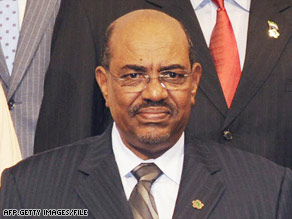
The International Criminal Court at the Hague issued an arrest warrant Wednesday for Sudanese President Omar Hassan al-Bashir for a five-year campaign of violence in Darfur.
Bashir is charged with seven counts of crimes against humanity and war crimes. The warrant does not mention genocide, but the court may issue an amended warrant to include that charge later, ICC spokeswoman Laurence Blairon said. Five counts are for crimes against humanity and include murder, extermination, forcible transfer, torture, and rape, Blairon said. The other two are for war crimes, for intentionally directing attacks against civilians and for pillaging. “Bashir’s official capacity as head of state does not exclude criminal responsibility or get him immunity,” Blairon said in announcing the warrant. The ICC’s chief prosecutor, Luis Moreno-Ocampo, filed genocide charges against al-Bashir in July last year, accusing him of masterminding attempts to wipe out African tribes in the war-torn region with a campaign of murder, rape and deportation. Watch more on the verdict » The violence in Darfur erupted in 2003 after rebels began an uprising against the Sudanese government. To counter the rebels, Sudanese authorities armed and cooperated with Arab militias that went from village to village in Darfur, killing, torturing and raping residents there, according to the United Nations, Western governments and human rights organizations. The militias targeted civilian members of tribes from which the rebels drew strength. Moreno-Ocampo told CNN’s Nic Robertson last year that he had “strong evidence that al-Bashir is committing a genocide.” But Blairon said the evidence submitted to judges so far doesn’t support that charge. “In order to speak about a genocide, you need to have a clear intent that a person wishes to destroy, in part or as a whole, a targeted group, a specific group,” Blairon said. “In this specific case, the (judges of the) Pre-Trial Chamber 1 has not been able to find that there were reasonable grounds to establish the genocidal intent.”
Don’t Miss
ICC prosecutor explains charges
‘They told me to kill, to rape children’
Sudan: More ‘blood’ result of genocide charge
Sudan calls meeting over ‘genocide charge’
U.N.: Darfur attack kills peacekeepers
Prosecutors may still return to the chamber if new evidence of genocide emerges, and the court may then decide to issue an amended warrant, she said. Al-Bashir bears responsibility for the crimes committed in Darfur, Moreno-Ocampo said last year, because he sat at the apex of the government. “For such crimes to be committed over a period of five years and throughout Darfur, al-Bashir had to mobilize and keep mobilized the whole state apparatus; he had to control and direct perpetrators; and he had to rely on a genocidal plan,” Moreno-Ocampo wrote as background for arrest warrant request. Sudanese Vice President Ali Osman Mohammed Taha has long rejected the authority of the ICC, saying Sudan was not a signatory to the court’s creation. “Hence there is no legal obligation or power over Sudan, whether Sudanese organizations or citizens,” he said. Taha also called the charges an attempt to “paralyze” his country. And Abdalmahmood Abdalhaleem Mohamad, Sudan’s ambassador to the United Nations, said his government would respond through legal, political and “other means.” “The limit is the sky for our retaliation,” he said. About 300,000 people have died in Darfur, the United Nations estimates, and 2.5 million have been forced from their homes. Watch a tour of Darfur’s deserted Northern Corridor »
Last month, renewed fighting forced thousands of people in the southern part of Darfur to seek security and shelter at a refugee camp in the north of the war-torn area, the United Nations said. The U.N.’s Office for the Coordination of Humanitarian Affairs (OCHA) reported that fighting in Muhajeria and Shearia between Sudanese government forces, and the rebel Justice and Equality Movement (JEM), drove over 15,000 people north to the Zam Zam camp.